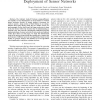Free Online Productivity Tools
i2Speak
i2Symbol
i2OCR
iTex2Img
iWeb2Print
iWeb2Shot
i2Type
iPdf2Split
iPdf2Merge
i2Bopomofo
i2Arabic
i2Style
i2Image
i2PDF
iLatex2Rtf
Sci2ools
INFOCOM
2006
IEEE
2006
IEEE
Analyzing the Energy-Latency Trade-Off During the Deployment of Sensor Networks
— The inherent trade-off between energy-efficiency and rapidity of event dissemination is characteristic for wireless sensor networks. Scarcity of energy renders it necessary for nodes to spend a large portion of their lifetime in an energyefficient sleep mode during which they do neither receive nor send messages. On the other hand, the longer nodes stay in sleep mode, the slower will be the reaction time for disseminating an external event. The trade-off is prominently exhibited during the deployment phase of sensor networks, if some nodes are deployed earlier than others. In this paper, we study this fundamental trade-off by giving a formal model that enables us to compare the performance of different protocols and algorithms. Based on this model, we propose, analyze, and simulate two novel algorithms which significantly outperform existing solutions.
| Added | 11 Jun 2010 |
| Updated | 11 Jun 2010 |
| Type | Conference |
| Year | 2006 |
| Where | INFOCOM |
| Authors | Thomas Moscibroda, Pascal von Rickenbach, Roger Wattenhofer |
Comments (0)

